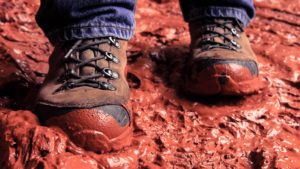We have a guest post on our blog today from Roxanne Turner. Roxanne is a Board Certified Life Coach with extensive training in ADHD and executive functioning, focusing on the process of getting things done.
I spent a big portion of my life working in barns and doing manual labor. I always marveled at how people stayed so clean at horse shows or at the barn. I always came home covered in dirt and you knew where I had been; by the eau’d horse perfume. When I was dating my husband, he always joked “how I wore my work.” He was in awe how filthy I got. Even now, when I clean I become covered in dirt. To me, there is a sense of satisfaction that I know I was fully committed and invested in that particular project.
When you work with your hands, you can see what you have accomplished. To this day, I love seeing a barn aisle knowing that the stalls are clean and every blanket and halter is where it should be. As I raise my boys, I am always looking for opportunities for them to “wear their work,” so they too can experience their version of satisfaction. Ironically, teaching your kids how to do the simple task of washing a car or sweeping a porch is developing executive skills. In most cases, there is an immediate feedback loop of getting to see the results of your labor.
Here are some of my favorite examples of dirty jobs:
When my eldest was 9, he participated in a half-day baseball camp while his brother was in a full day camp. I worked from home and wasn’t going to let him play video games for the remaining half of the day. I love clean vehicles, so I decided that cleaning my truck was a perfect job for him. I wasn’t worried about him damaging my F-150, because it had close to 200k miles and plenty of bumps and bruises. I handed him the hose, a bucket, soap, and sponge and said ‘go to it.’ My husband was convinced the job wouldn’t take him long. Four hours later, he was done. How my husband had underestimated him!
Watching my 9-year-old was like watching a situation comedy on TV. He would squirt the water into the air out of the hose, and become absolutely drenched. He would switch between slapping the truck with the sponge and actually using it. I had a hard time not laughing on my conference calls. But I just let him figure it out. He was soaking wet, covered in soap and even managed a dirt mustache. Upon inspection, he had missed some spots and had to redo his work but, at the end of the day, he was proud of what he had accomplished.
So far, the best dirty job, I found was when both boys were in middle school. They were given the job of removing a year’s worth of old hay under some pallets to get ready for a new delivery of hay at a local horse farm. They would have to rack huge piles of moldy old hay and then drive a small gator so they could dump it. Then, they had to clean out and sort out the pallets, removing any that were damaged beyond repair.
Why I loved this job: they could do it relatively unsupervised, they were able to drive farm equipment, which they loved. They had to figure out how they were going to work together because they were being paid by the job and it was a huge job. It was hot, so they had to learn what to pack and to ask the owners if they needed more water or drinks. Those boys worked hard, and every time I picked them up they were filthy and a bit stinky. Each day, they would show me what they did for the day and talk about what was easy and hard. At the end of the job, they were both proud of their effort. Both said it was very hard and they actually didn’t mind the work. No, they weren’t interested in it as a permanent job.
So many of our students are struggling with executive function skills, taking the steps to complete projects. Paula Moraine in her book, Helping Students Take Control of Everyday Executive Functions, The Attention Fix, says that the process of learning is never a straight line from lesson to achievement. Instead, “learning requires trial and error, repetition, evaluation, and trying again.”
By doing dirty jobs, you are using the executive function skills of having to figure out how you get started, what’s next and what tools you need. (Organization and planning.) This also gives your kids the chance to be responsible and in control of how and what they do. (Self-regulation and impulse control)
The beauty of summer is that the sky is blue and the sun is shining. What tasks or projects can your kids do where they can be outside accomplishing something with their hands. It doesn’t need to be perfect, actuality it should be far from it. Instead, the job should be about what they are accomplishing on their own and doing for themselves. You too can have some great entertainment as your son or daughter washes your car or pulls weeds in the backyard. Just make sure it’s not your favorite hydrangeas or a brand-new car. I have lost a multitude of flowers in the process, because I forgot to point them out and the kids assumed they were weeds. Oops.

